Holocaust trivialization refers to any comparison or analogy that diminishes the scale and severity of the war crimes that were committed by Nazi Germany during the Holocaust. The Wiesel Commission defined trivialization as the abusive use of comparisons with the aim of minimizing the Holocaust and banalizing it. Originally, holocaust meant a type of sacrifice that is completely burnt to ashes; starting from the late 19th century, it started to denote extensive destruction of a group, usually people or animals. The 1915 Armenian genocide was described as a "holocaust" by contemporary observers.
Paul R. Bartrop is an Australian historian of the Holocaust and genocide. From August 2012 until December 2020 he was Professor of History and Director of the Center for Judaic, Holocaust and Genocide Studies at Florida Gulf Coast University, Fort Myers, Florida. Between 2020 and 2021 he was an honorary Visiting Professorial Fellow at the University of New South Wales, Canberra. In April 2021 he became Professor Emeritus of History at Florida Gulf Coast University, and in 2022 he became an honorary Principal Fellow in History at the University of Melbourne. During the academic year of 2011-2012 he was the Ida E. King Distinguished Visiting Professor of Holocaust and Genocide Studies at Richard Stockton College of New Jersey.
Tadeusz Piotrowski or Thaddeus Piotrowski is a Polish-American sociologist and author. He is a professor of sociology in the Social Science Division of the University of New Hampshire at Manchester in Manchester, New Hampshire.

Neighbors: The Destruction of the Jewish Community in Jedwabne, Poland is a book published in 2000 written by Princeton University historian Jan T. Gross exploring the July 1941 Jedwabne massacre committed against Polish Jews by their non-Jewish neighbors in the village of Jedwabne in Nazi-occupied Poland.
Debórah Dwork is an American historian, specializing in the history of the Holocaust. She is the Founding Director of the Strassler Center for Holocaust and Genocide Studies and formerly served as the Rose Professor of Holocaust History at Clark University in Worcester, Massachusetts.
Holocaust studies, or sometimes Holocaust research, is a scholarly discipline that encompasses the historical research and study of the Holocaust. Institutions dedicated to Holocaust research investigate the multidisciplinary and interdisciplinary aspects of Holocaust methodology, demography, sociology, and psychology. It also covers the study of Nazi Germany, World War II, Jewish history, antisemitism, religion, Christian-Jewish relations, Holocaust theology, ethics, social responsibility, and genocide on a global scale. Exploring trauma, memories, and testimonies of the experiences of Holocaust survivors, human rights, international relations, Jewish life, Judaism, and Jewish identity in the post-Holocaust world are also covered in this type of research.
The "double genocide theory" claims that two genocides of equal severity occurred during World War II: it alleges that the Soviet Union committed atrocities against Eastern Europeans that were equivalent in scale and nature to the Holocaust, in which approximately six million Jews were systematically murdered by Nazi Germany. The theory first gained popularity in Lithuania after the fall of the Soviet Union in 1991, particularly with regard to discussions about the Holocaust in Lithuania. A more extreme version of the theory is antisemitic and vindicates the actions of Nazi collaborators as retaliatory by accusing Jews of complicity in Soviet repression, especially in Lithuania, eastern Poland, and northern Romania. Scholars have criticized the double genocide theory as a form of Holocaust trivialization.
The assertion that the Holocaust was a unique event in human history was important to the historiography of the Holocaust, but it has come under increasing criticism in the twenty-first century. Related claims include the claim that the Holocaust is external to history, beyond human understanding, a civilizational rupture, and something that should not be compared to other historical events. Uniqueness approaches to the Holocaust also coincide with the view that antisemitism is not another form of racism and prejudice but is eternal and teleologically culminates in the Holocaust, a frame that is preferred by proponents of Zionist narratives.
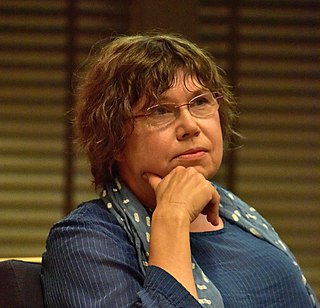
Barbara Engelking is a Polish psychologist and sociologist specializing in Holocaust studies. The founder and director of the Polish Center for Holocaust Research in Warsaw, she is the author or editor of several works on the Holocaust in Poland.
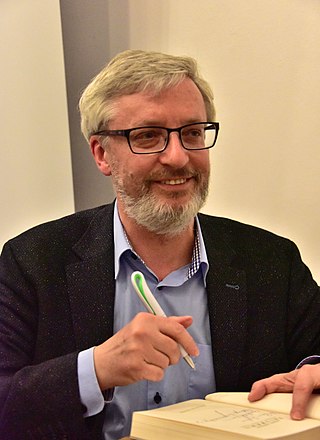
Jacek Leociak is a Polish literary scholar and historian as well as author. He is a professor of humanities and an employee of the Institute of Literary Research at the Polish Academy of Sciences and the Polish Center for Holocaust Research in Warsaw.

Night Without End: The Fate of Jews in German-Occupied Poland, co-edited by historian Jan Grabowski and sociologist Barbara Engelking, is a two-volume study published in Polish in 2018 by the Polish Center for Holocaust Research in Warsaw, Poland. The book covers, in case-study analyses, the history of Jews during the Holocaust in nine rural areas of the German-administered General Government. An English-language version was published by Indiana University Press in September 2022.
The Warsaw Ghetto Hunger Study was a study taken up by Jewish doctors imprisoned in the Warsaw Ghetto in 1942. The Nazis, intent on starving the ghetto within months, allowed no more than a daily intake of 180 calories per prisoner – less than 10% of the recommended energy intake for a healthy human being – while withholding vaccines and medicine that would be necessary to prevent the spread of disease in the dense ghetto. This resulted in a thriving black market which supplied about 80% of the ghetto's food, and a network of 250 soup kitchens operated by the Joint, which at one time had served as many as 100,000 meals per day.
Carol Rittner is an American nun and Holocaust historian. She is a Distinguished Emerita Professor of Holocaust and Genocide Studies and Dr. Marsha Raticoff Grossman Professor of Holocaust Studies at Stockton University.
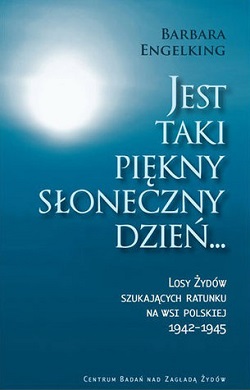
Such a Beautiful Sunny Day: Jews Seeking Refuge in the Polish Countryside, 1942–1945 is a 2016 book by Polish historian Barbara Engelking. It was first published in Polish in 2012 as Jest taki piękny, słoneczny dzień: Losy Żydów szukających ratunku na wsi polskiej 1942–1945. It focuses on the subject matter of The Holocaust in Poland.

The Warsaw Ghetto: A Guide to the Perished City is a 2009 book by Barbara Engelking and Jacek Leociak. It was first published in Polish in 2001 as Getto warszawskie. Przewodnik po nieistniejącym mieście. The book focuses on the Warsaw Ghetto.
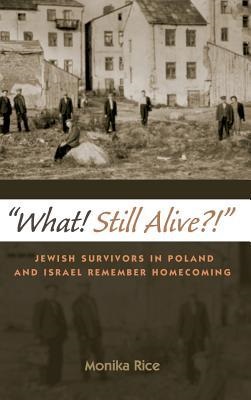
"What! Still Alive?!": Jewish Survivors in Poland and Israel Remember Homecoming is a 2017 book by historian Monika Rice that deals with the memories of Jewish Holocaust survivors of their first encounters with ethnic Poles after liberation from Nazi German rule. The testimonies were all found in archives at Yad Vashem and the Jewish Historical Institute in Poland.

The relationship between the Armenian genocide and the Holocaust has been discussed by scholars. The majority of scholars believe that there is a direct causal relationship between the Armenian genocide and the Holocaust, however, some of them do not believe that there is a direct causal relationship between the two genocides.
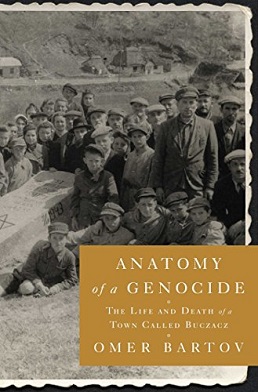
Anatomy of a Genocide: The Life and Death of a Town called Buczacz is a 2018 book by historian Omer Bartov exploring ethnic relations between Poles, Ukrainians, and Jews in the town of Buczacz with a focus on the Holocaust.
Rachel Feldhay Brenner was a Polish-born college professor, writer, and scholar of Jewish literature. She was president of the Association for Israel Studies from 2007 to 2009.
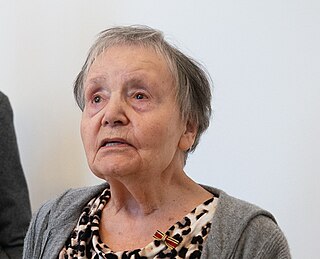
Rachel Kostanian is a Lithuanian Jewish activist, founder and longtime director of a Holocaust museum in Vilnius, and book author. She is a recipient of the Order of Merit of the Federal Republic of Germany.










